The
PhotoDrama of Creation
Section
1
God's
Glory in the Heavens
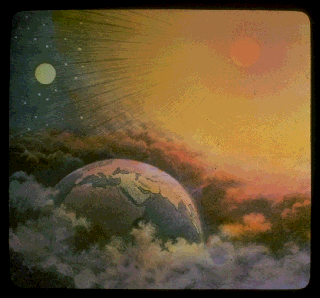
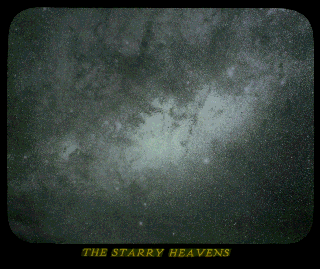
"The
reverence of Jehovah is the beginning of wisdom."
Only the foolish say in their heart, "There is no
God." "Day unto day uttereth speech, and night
unto night showeth knowledge." "The heavens
declare the glory of God."--Psalms 111:10; 14:1;
19:1,2
An
appreciation of the infinite Power of the Creator and
of our own littleness should make us teachable. The study
of Creation is the "Key of Knowledge." Using
this Key we begin to realize that the only worthy ambition
is to co-operate with our Creator's beneficient designs
respecting His Creation.
The
planets of our System compared with our Sun are as nothing.
Imagine the Sun's diameter that of a large flour barrel:
Jupiter would compare as a small orange, Earth and Venus
as peas, and Mercury and Mars as raspberry seeds.
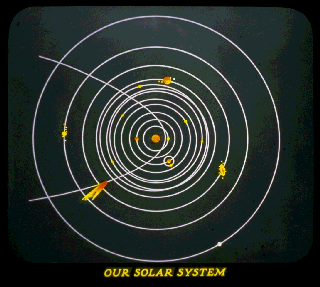
The
Sun is three hundred thousand times the size of our Earth.
A train at thirty miles an hour could go around the Earth
in one month, but three hundred and forty years would
be required for it to travel the circumference of the
Sun.
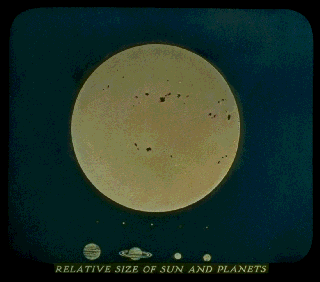
Our
day and night are the result of the Earth's rotation on
its own axis, while its motion around the Sun marks our
year. Planets nearer the Sun have shorter orbits, and
hence, shorter years, while remote ones have longer years.
A year on the planet Mercury would equal three of our
months. On Neptune, farthest off, a year equals 164 of
Earth's years.
Yet
our Sun is only one of the fixed stars,
of which the most up-to-date astronomical methods estimate
there are one hundred and twenty-five millions. Around
each of these fixed stars undoubtedly revolves
a planetary System like our own. Thus reckoned, there
are one thousand million worlds. Even this is not the
limit. If we should stand upon the farthest and dimmest
star, we should no doubt from there see as many more beyond.
We are appalled at the greatness of the Universe.
The
zodiacal signs illustrate various sections of the heavens,
visible at different seasons.
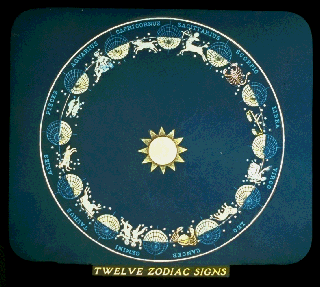
The
First Day or Epoch
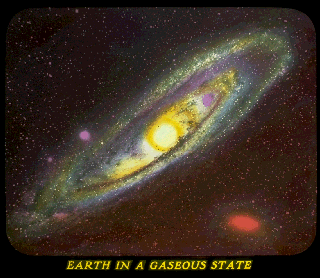
The
Genesis account tells nothing about the formation of the
Earth itself. It says, "In the beginning the Earth
was--without form and void"--shapeless, empty.
There were neither mountains nor valleys, trees nor shrubs,
rivers nor oceans, but the Earth was. How long
before that it had been created, is not stated. The account
of the Days of Creation given in Genesis relates not to
the construction of our globe, but to the ordering
of it for human habitation.
There
are various theories regarding its formation. We follow
the one most closely harmonizing with the Bible. It is
called the Vailian theory. It assumes that Saturn's rings
and Jupiter's belts illustrate Earth's development as
a planet.
The
Earth was once molten, as indicated by the igneous rocks
of the Azoic period: so called by scientists, but not
discussed in the Bible. When the Earth was molten, its
water and minerals were thrown off a great distance in
gaseous form. As these cooled and took shape, they constituted
great rings at a distance from the Earth.
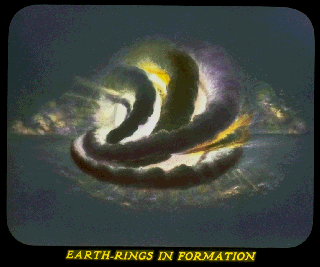
Gradually
the motion of the rings became different from that of
the Earth in proportion to the distance from the center
of gravity. These rings of water and mineral gradually
approaching the Earth would be kept off by centrifugal
force, particularly strong at the equator. The "brooding"
of Holy Energy developed a light, probably resembling
the Aurora Borealis--not sunlight. The Sun did not appear
until the Fourth Day.
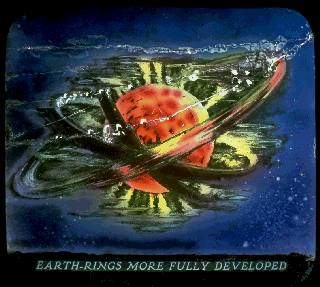
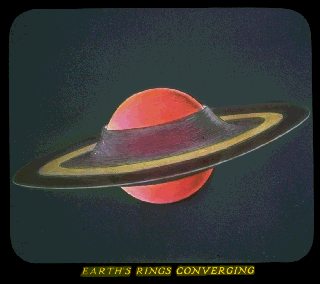
"Let
there be light! and there was light." Thus, briefly,
is summed up the result of the 7,000 years, styled the
First Day. Not that God's Word would not have been sufficient
for any miracle, but because He prefers to work out
His glorious designs along natural lines.--Genesis 1:3.
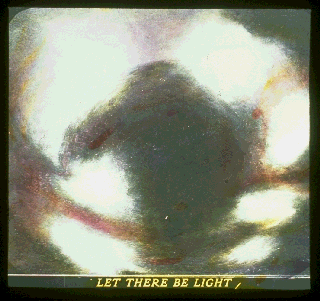
There
are scientists who claim that the Earth still has one
ring about it, an electrical ring which, falling, will
in a few years destroy fermentation, microbes and parasites,
and greatly assist plant and animal life.
The
Second Day or Epoch
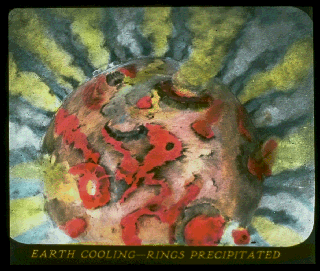
The
expressions "evening and morning" and "day"
cannot be understood to signify twenty-four-hour days,
for neither Sun nor Moon was visible until the Fourth
Day. The Earth was swathed in impenetrable darkness.
The
word "day" applies to any period, or Epoch,
as for instance, the "Day of temptation in the wilderness"--forty
years. (Psalms 95:8.) Note again, that we read of the
"Day of Christ," evidently referring to the
thousand-year Day in which Messiah is to be King over
all the Earth. (Isaiah 2:11.) In the common affairs of
life we use the word "day" similarly, when referring
to Caesar's day, Napoleon's day, etc.
We
follow the theory that each of the Seven Days of
the Creative Week was a period of seven thousand years.
This, seven times seven thousand, equals forty-nine thousand
(7x7,000=49,000) years, ushering in a grand Jubilee Epoch.
As
one after another the encircling rings of water and minerals
approached the Earth they would spread out like a great
canopy, but would not be permitted to fall upon the Earth
because of the circumambient air, referred to in Scripture
as a "firmament." Saturn's rings have not yet
fallen.
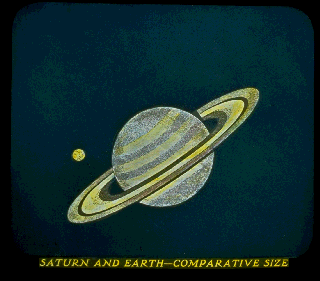
God
made the firmament in the second, or Palaeozoic Day, and
separated the waters which were under the firmament from
the waters which were above the firmament. (Genesis 1:7.)
The strongly mineralized waters above the Earth, held
off by the "firmament" and centrifugal force,
greatest at the equator, gradually concentrated at the
two poles, where later they broke and then reached the
Earth, forming layer after layer of mineralized earth
deposited by the water which rushed from both poles toward
the equator.--Genesis 7:11,18.
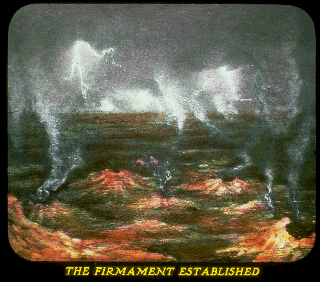
These
rings, or belts, of water and minerals followed each other
as great deluges upon the Earth--perhaps thousands of
years apart. The Deluge of Noah's day was the last, of
pure water only, heavier minerals being attracted first.
Hence minerals are generally under several layers of shale
and soil.
The
Third Day or Epoch
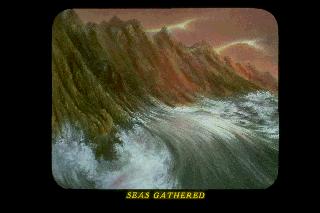
"And
God said, Let the waters under the heaven be gathered
together unto one place, and let the dry land of the Earth
appear; and it was so. And God called the dry land earth;
and the gathering together of the waters called He seas.
And the evening and the morning were the Third Day."
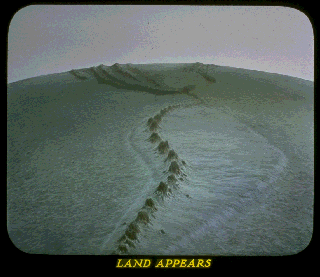
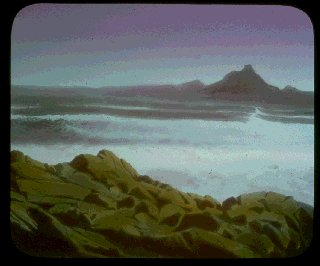
The
beautiful simplicity of this statement might mislead us
into thinking that the gathering together of the oceans
and the erection of mountains were works of magic. While
Divine operations are all great and wonderful, they are
usually accomplished by reasonable methods, called the
"course of Nature." And Nature's course must
be marked out by Nature's God.
The
ring theory of Cosmogony is that several rings had precipitated
themselves upon the Earth during this Third Epoch-Day.
These, according to the Divine intention, so increased
the pressure on the crust of the Earth as to cause it
to buckle or wrinkle. These depressions became ocean beds,
and the upheavals became mountain ranges. Thus was the
work of the Third Day accomplished. The waters were gathered
into seas and oceans, the dry land was upheaved and began
gradually to drain off in preparation for vegetation.
This draining must have required a long time.--Genesis
1:9,10.
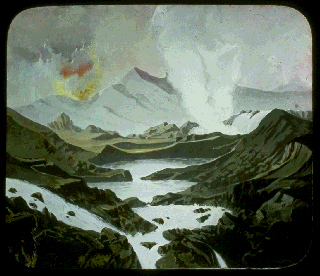
We
need not assume that all the continents as we now know
them were thrown up on the Third Epoch-Day. In all probability
the American continent was thrown up much later than were
Europe, Asia and Africa. Earthquake disturbances in our
day have changed the surface of the land. They give us
a reasonable conception of how the Divine command was
executed on the Third Day, preparatory to Earth's vegetation.
Appropriately
we next read: "And the Earth brought forth grass,
and herb yielding seed after his kind, and the tree yielding
fruit." That is to say, vegetation began on
the Third, or Carboniferous Day, though it did not reach
its perfection until after the light of the Sun penetrated.
There are grasses and other vegetation which prosper best
in darksome shades.
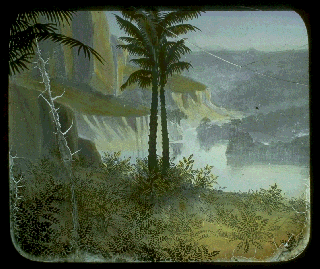
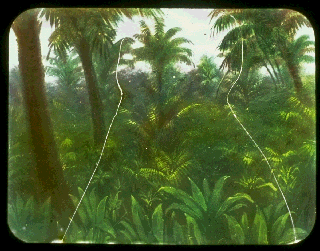
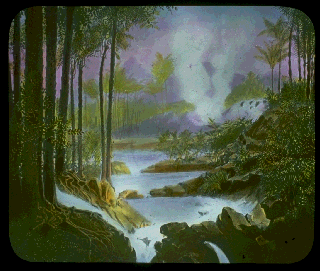
The
Fourth Day or Epoch
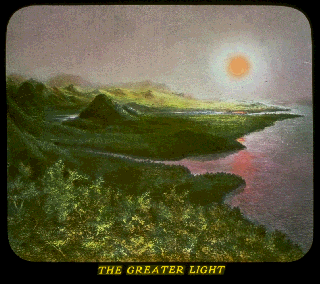
"And
God made two great lights, the greater light to
rule the day and the lesser light to rule the night."
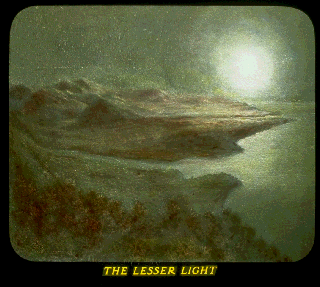
It
is not necessary to suppose that the Sun and the Moon
were created after our Earth. Instead there is a much
more reasonable way of viewing the matter. The Sun, the
Moon and the Stars were created long before, but had never,
up to this time, cast their light upon the Earth because
of the impenetrable veil which canopied it.
The
appearance of the Sun and the Moon on the Fourth Day implies
that another ring broke at that time and precipitated
its great mass of water and mineral upon the Earth. Great
gullies were washed between the mountains.
The
atmosphere, heavily charged with carbon, was very favorable
to the development of plant life.
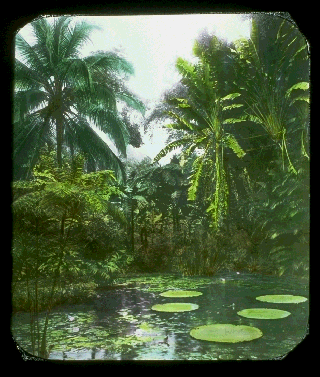
It
is supposed that the Earth still had considerable heat
in its crust, that oceans were warm and highly carboniferous,
and that the air was surcharged with carbon to the extent
that no breathing animal could have existed. But those
very conditions were extremely favorable to gigantic growths
of vegetation.
This
giant vegetation presumably passed into a condition resembling
that of the peat-beds of our day. These beds of incipient
coal afterwards came under great pressure, as one after
another the rings of Earth came down in deluges, burying
vegetation under slimy deposits. Our coal-fields are the
result.
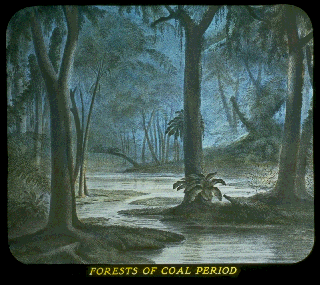
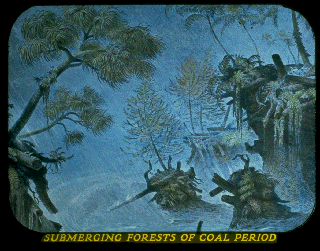
We
are not to assume that the Sun and the Moon shone on the
earth then as now. But they were discernible even through
heavy banks of fog and carbon-laden atmosphere. The influences
of the Sun and the Moon were necessary to prepare for
higher forms of plant and animal life.
We
may as properly lay stress on the word rule as
on the word made in this text. God caused
the Sun to rule the day and the Moon to rule the night.
Besides, symbolically, it is claimed that the Moon represents
the Law Covenant rule, and the Sun the New Covenant rule.
The
Fifth Day or Epoch
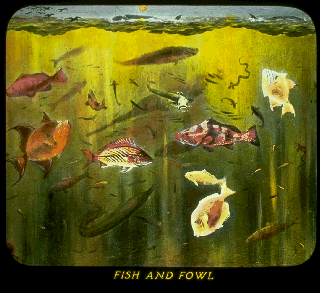
The
carboniferous qualities of the water and the atmosphere
having been absorbed into the cretaceous organisms of
the sea, which formed beds of limestone, and into the
rank vegetation which went to form the coal beds, the
atmosphere of Earth began to be pure enough to permit
life in breathing animals. To this period, therefore,
belong the amphibious developments of animal life, such
as the crocodile and other animals which can live either
on land or in the water. Birds belong to this period,
and in the latter part of it appeared the great Mammoth
and the Sloth.
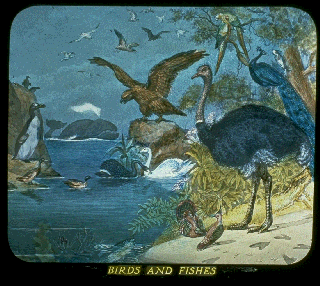
The
conflict between Evolution and the Bible has been sharp.
Nevertheless, unnecessary friction has been generated.
Only
in respect to man does the Bible declare a special, direct
creation of God. The statements of Genesis in respect
to the lower creatures rather favor something along the
lines of specialized Evolution. God said, "Let the
waters bring forth abundantly the moving creature that
hath life, and fowl that may fly above the Earth."
(Genesis 1:20,21.) This is exactly in harmony with our
scientific findings that the beginning of life came from
the waters, and later extended to the birds, and later
to land animals.
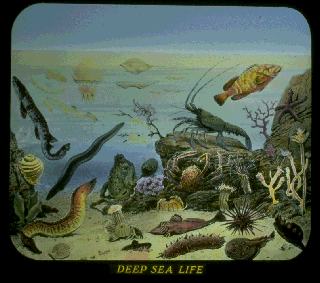
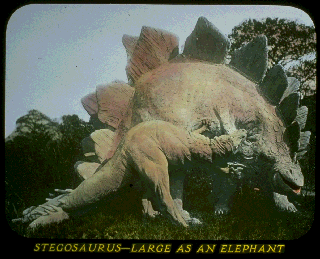
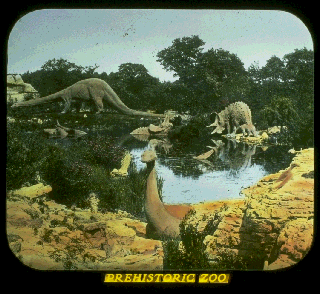
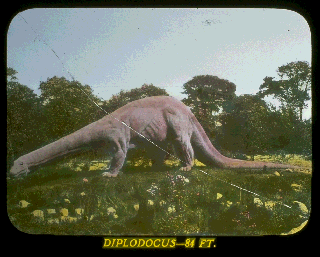
The
Darwinian theory has disappointed those who swallowed
it without a sufficiency of demonstration as to its truth.
(1 Timothy 6:20.) Recent demonstrations show that every
mixture of species and kind, even where partly successful,
means a reversion to the original standards within the
third or fourth generation in plants, flowers, fruits
and in animals.
The
correct thought would seem to be that under Divine supervision
various orders of creation were brought to a state of
development and a fixity of species, not to be turned
aside nor thereafter altered. Not one suggestion is offered
respecting human evolution from a lower creature; but
quite the contrary. The Bible furnishes merely a basis
for faith, "that the man of God may be thoroughly
equipped."--2 Timothy 3:17.
The
Sixth Day or Epoch
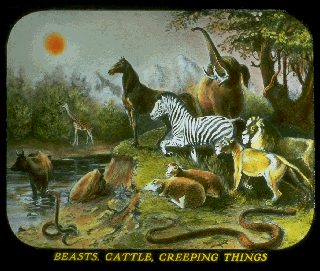
As
the carbon-laden atmosphere became more pure, vegetation
became less rank. The animals changed correspondingly.
The heavy-boned Sloth and Mammoth gave place to less bony
varieties of animals, common today.
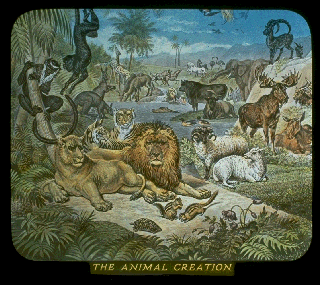
The
specialization in the case of man's creation is shown
in his vast superiority over the lower animals. The first
man, Adam, was an image of his Creator, the highest type
of fleshly or animal being. That image of his Creator
consisted in his moral and intellectual likeness. It is
difficult to judge from present human conditions all that
is meant by God's image, because we have no sample of
perfect humanity for comparison. "All have sinned
and come short of the glory of God" in which Adam
was created. (Psalm 8:5.) Sin and Death have reigned and
the Godlikeness has been lost. All need Restitution.
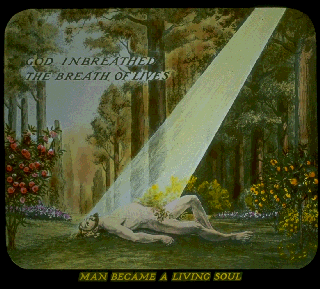
It
was toward the close of the Sixth Day, or approximately
forty-two thousand years from the time of beginning the
ordering of Earth, that God created Man.
The
image of God from this standpoint would mean a human being
thoroughly in tune with the Infinite One, one that would
have no unrighteousness nor iniquity in him. Adam's transgression
was not the result of ignorance, nor of pure wilfulness.
It was the result of temptation, which his limited knowledge
accentuated. His responsibility was for the knowledge
he possessed. He knew that he was disobeying God.
When
thinking of man in the image of God, we instinctively
look back to "The Man Christ Jesus," "holy,
harmless, undefiled and separate from sinners," and
like the first Adam, whose penalty He came into the world
to meet.--1 Cor.15:22.
"After
Our likeness let him have dominion." Adam's dominion
over the lower animals was like God's dominion over the
Universe. Angels, although in God's image, do not have
a Godlike dominion over creatures of a lower order. Man's
dominion, overthrown by sin, is to be restored by Messiah's
Kingdom.--Acts 3:19-21.
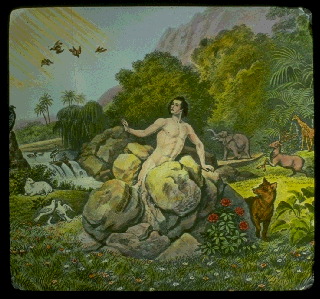
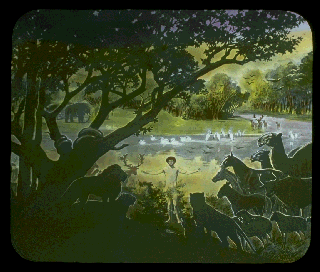
The
Seventh Day or Epoch
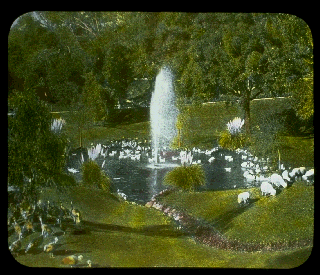
In
this presentation, we are following a line of thought
which seems to be growing in acceptance among Bible students.
We are living in the Seventh Creative Epoch, or Day--
that began where the Sixth Day closed, after God had created
Adam in His own image and likeness.--Genesis 1:26,27.
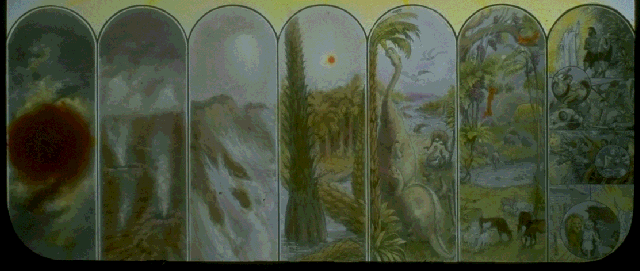
God
there rested from His work--from creating. He foreknew
the permission of Sin and its dire effects upon humanity.
He foreknew the steps He would take in providing ultimately
a Redeemer for the race, and that the Redeemer would select
a little company of believers, figuratively styled the
Bride of Christ. To this Redeemer and His Bride, God intended
to give the dominion, control of Earth. God purposed that
Messiah's Kingdom of Righteousness should eventually uplift
the willing and obedient from Sin and Death conditions.
God
rested from His work of creating in that He did
not actively employ His Power to overthrow Sin and uplift
mankind. God rested the matter in the hands of the Redeemer,
Jesus, to be accomplished through His sacrifice for sins
and His glorious Reign for the release of mankind from
Sin and Death. The Church, God's new creation of
this rest period, is Heavenly, not earthly.--2
Corinthians 5:17; Hebrews 3:1; 4:1-4.
It
is claimed that, according to the Bible chronology, six
thousand years from Adam have already passed. If so, the
thousand years of Messiah's Reign, which is to close the
great Seventh Epoch-Day, is near at hand.
According
to this beautiful theory, the work of Messiah in His thousand-year
Reign soon to begin will complete the Creation. Not only
will the race be brought to human perfection, but incidentally
man will have obtained the needed experience in respect
to good and evil. Meantime, also, the Earth will be gradually
coming to a state of perfection--Paradise restored world-wide.
Both human perfection and the perfection of the Earth
were fittingly represented in Eden, when Adam was in his
Maker's image--a King.
Mother
Eve Created
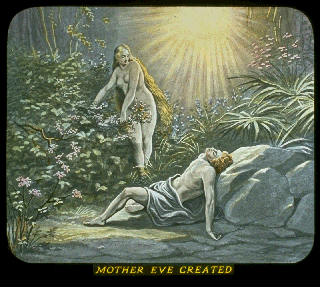
As
the Creation of Adam was at the close of the Sixth Day,
the Creation of Mother Eve is indicated as having been
accomplished in the beginning of the Seventh Day. However
we view the matter, the first pair were created approximately
in the beginning of the Seventh Day or Epoch, which is
now nearly completed. Mother Eve was merely a portion
of Adam separated from him for a special purpose--for
the propagation of a race. Adam possessed originally in
his own person the qualities masculine and feminine which
subsequently were divided between him and his wife, when
she was taken from his side.--Genesis 2:21-23; 1 Corinthians
11:8.
Adam
for a time was alone in Eden, finding no congenial companionship
in the beasts and the birds. Mother Eve was his mate,
bone of his bone and flesh of his flesh. Their very difference
of quality and disposition made them the more companionable
to each other, because each found in the other the desired
complement. They twain were one; neither one was complete
without the other. The feminine qualities of Adam's perfection
he still possessed--in Mother Eve.
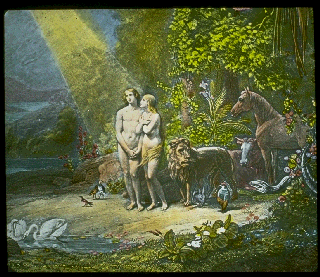
Adam
was the father of the race and failed to give it life.
Jesus is to become its second father, the Second Adam,
through whom everlasting life may be attained.--1 Cor.
15:21.
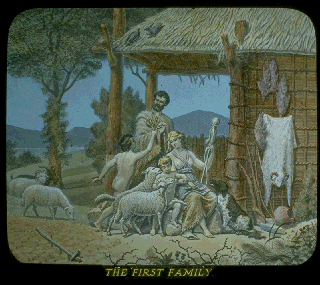
Eve
was associated with Adam in the sin and disobedience which
brought the penalty. So the Elect Church, the Bride of
Christ, when completed, glorified, will be His Joint-Heir
in His Kingdom, and His associate in the "regeneration"
of the world during His Messianic Reign.--Romans 8:17;
Matthew 19:28.
Another
suggestion has been offered: Jesus declared that those
who attain to that resurrection will neither marry nor
be given in marriage. As Adam originally possessed all
the qualities of character, masculine and feminine, so
humanity, when fully restored to the image and likeness
of God, will re-attain perfection of individuality. Sex
divisions will then be no more. Earth will be filled with
sufficient population.--Luke 20:35,36.
Mother
Eve Beguiled
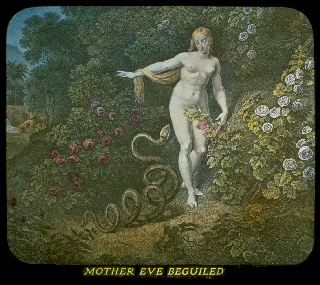
The
New Testament bears out the story of Genesis, of Mother
Eve's deception, and that Father Adam yielded to disobedience
through her influence. St.Paul declares that Adam was
not deceived, and that he therefore had the greater responsibility.
The Scriptures everywhere portray that it is through Adam's
disobedience that the condemnation passed upon his entire
race. He was its responsible head. "By one man sin
entered into the world, and death by sin, and so death
passed upon all men."--Romans 5:12.
The
Bible account tells of Mother Eve's thirst for knowledge,
and of Satan's taking advantage of this, beguiling her
into disobedience. We need not suppose that the serpent
spoke audibly; rather, as we say, "Actions speak
louder than words." It is probable that the serpent
spoke in this manner.
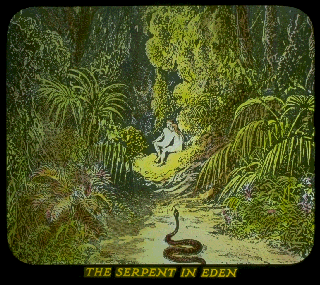
God
had authorized our first parents to freely eat of all
the fruits of Paradise except of the species called "The
Tree of the Knowledge of Good and Evil." It was forbidden
for a time as a test of their loyalty. The eating of the
fruit of this tree, they were forewarned, would bring
upon them the curse--the Death Sentence. The serpent ate
of various fruits, and seemed especially fond of the forbidden
fruit. Observation proved that the fruit did not kill
the serpent, and the inference drawn by Mother Eve was
that God had forbidden the use of the very best tree in
Eden. Her conclusion was that God had a selfish motive
in forbidding the use of that fruit; that He feared His
creatures would become as wise as Himself.
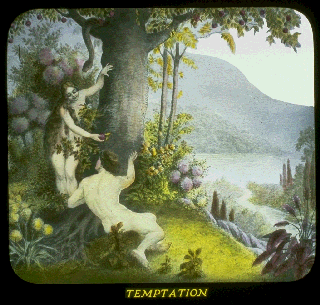
Mother
Eve did not broach these suspicions to her husband. She
would eat, acquire the knowledge God was withholding,
and then assist Adam to it.
--Genesis 3:6.
Adam
realized the seriousness of Eve's disobedience. He thought
of the long days before he had her companionship. Now,
he would be lonely again. In desperation Adam determined
to join Eve in the Sin and its penalty. Adam's death was
a slow suicide! His dying lasted 930 years.
|
